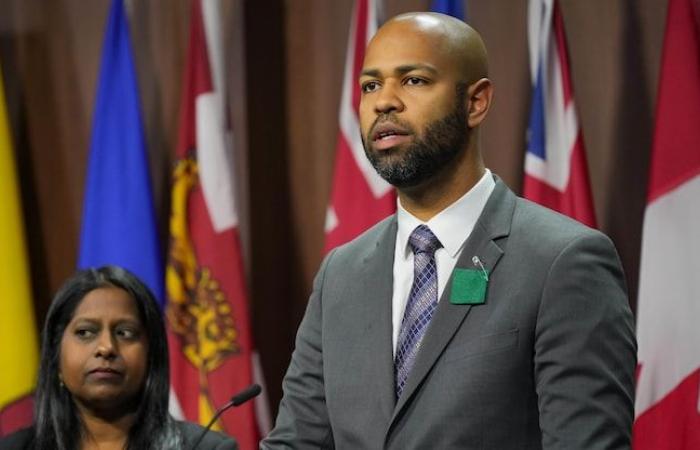Such intervention would be considered an attack on the autonomy of the federated states
Ministers Simon Jolin-Barrette (Justice) and Jean-François Roberge (Secularism) reacted Thursday morning on social networks, a few minutes after the publication of the judgment of the highest court in Canada.
Adopted on June 16, 2019 (new window)the Law on State Secularism, better known as the loi 21
prohibits certain state employees in positions of authority – such as judges, police officers, prison guards and teachers – from wearing visible religious symbols while performing their duties.
The Supreme Court announced Thursday morning that it will hear the case (new window)which has already been the subject of judgments by the Quebec Court of Appeal (new window)last year, and by the Superior Court (new window)in 2021.
At the heart of this case is the preventive use of the notwithstanding provision, also called parliamentary sovereignty clause
a measure included in the Constitution during the 1982 patriation to convince the provinces to give their approval to the project of then Prime Minister Pierre Elliott Trudeau.
For this reason, Quebec calls the other federated states
from Canada to defend
in position. It is about our autonomy – autonomy which is at the very foundation of the federative pact
underline MM. Jolin-Barrette and Roberge in their message.
Waiting for, the government of Quebec will use the parliamentary sovereignty provision for as long as necessary to defend our societal choices
they assure.
The National Assembly has already voted twice to protect the loi 21
courts: in 2019, when the law was adopted, then last year, as part of Bill 52 (new window)because the Constitution provides that the exemption provision must be renewed every five years.
A legal and… political debate
In Ottawa, only the Bloc Québécois defends the loi 21
. Justin Trudeau – just like Pierre Poilievre, of the Conservative Party of Canada (CPC), and Jagmeet Singh, of the New Democratic Party (NDP) – has always affirmed that the federal government should intervene if the case ends up in the Supreme Court.
In this sense, Bloc leader Yves-François Blanchet declared Thursday that he would be very surprised
what the small, absolutely Toronto cohort of candidates for the leadership of the Liberal Party runs counter to that
and predicts that the loi 21
will be an issue during the next federal election campaign.
As if to prove him right, Karina Gould (new window)who aspires to succeed Justin Trudeau, reacted to the Supreme Court’s decision on Thursday by declaring that the role of the federal government was to support the rights of all Canadians
and that the Liberal Party was the charter party
.
Karina Gould is one of seven declared candidates to succeed Justin Trudeau.
Photo: The Canadian Press / PATRICK DOYLE
The Law on State Secularism also divides the parties in the National Assembly, but the Coalition Avenir Québec (CAQ), in power since 2018, defends it tooth and nail. The Legault government also declared on Thursday that it will fight to the end
to defend it.
-
Quebecers have chosen secularism; a legitimate collective choice which represents the culmination of decades of debate. It is essential, even vital, for Quebec to be able to make its own choices, choices that correspond to our history, our distinct social values and the aspirations of our nation.
Meeting with his team since Tuesday in Terrebonne with a view to resuming parliamentary work next week, the leader of the Parti Québécois, Paul St-Pierre Plamondon, for his part asked Pierre Poilievre to commit not to involve the government of Canada in this matter.
It’s a question of democracy
he argued Thursday morning at a press briefing, emphasizing that Quebecers were masters and responsible for their laws
.
Their democratic choices should not be overturned by a Canada which clearly feels above Quebecers in terms of morality or understanding of legal issues.
he protested.
Gathered in a pre-sessional caucus at the National Assembly, the deputies of Québec solidaire, who form the second opposition group, for their part limited themselves to noting that the legal process [suivait] its course
.
Recall that this law is largely immune from review by the courts due to the inappropriate use of the Quebec Future CoalitionCAQ to the derogation clauses, which we have always denounced
declared the party’s justice spokesperson, Guillaume Cliche-Rivard, in writing.
A power extraordinaire
became the standard
In the camp of the parties having formally requested the Supreme Court to intervene, the National Council of Muslims of Canada (CNMC) and the Autonomous Federation of Education (FAE) said they were satisfied with the court’s decision on Thursday.
At a press briefing in Ottawa, the president and CEOCEO of National Council of Muslims of CanadaCNMCStephen Brown, said he noticed that, since François Legault let the genie of legal authoritarianism out of the bottle
other provinces, such as Ontario (new window) and the Saskatchewan (new window)preemptively invoked the override provision of the Constitution.
What was supposed to be just a power to be used in extraordinary ways has become the norm
he lamented.
We now find ourselves in this uncomfortable position where eight judges will have to decide whether we live in a country where citizens have rights or [si nous vivons] in a country where citizens only have the permissions that politicians are willing to grant us.
“Bill 21 is an electoral law, designed to exploit feelings of anxiety towards religious minorities, particularly Muslim women wearing the veil,” reiterated the CEO of the National Council of Muslims of Canada, Stephen Brown, on Thursday. It is a law that divides society, a law passed with the explicit aim of taking away rights from certain unpopular minority groups. »
Photo: The Canadian Press / Chris Tanouye
Led by former PQ MPs Donald Turp and Étienne-Alexis Boucher, the Droits collectives Québec (DCQ) group also announced early Thursday that it will seek intervener status at the Supreme Court to defend the loi 21
. Other similar motions are expected to be filed in the coming weeks.







